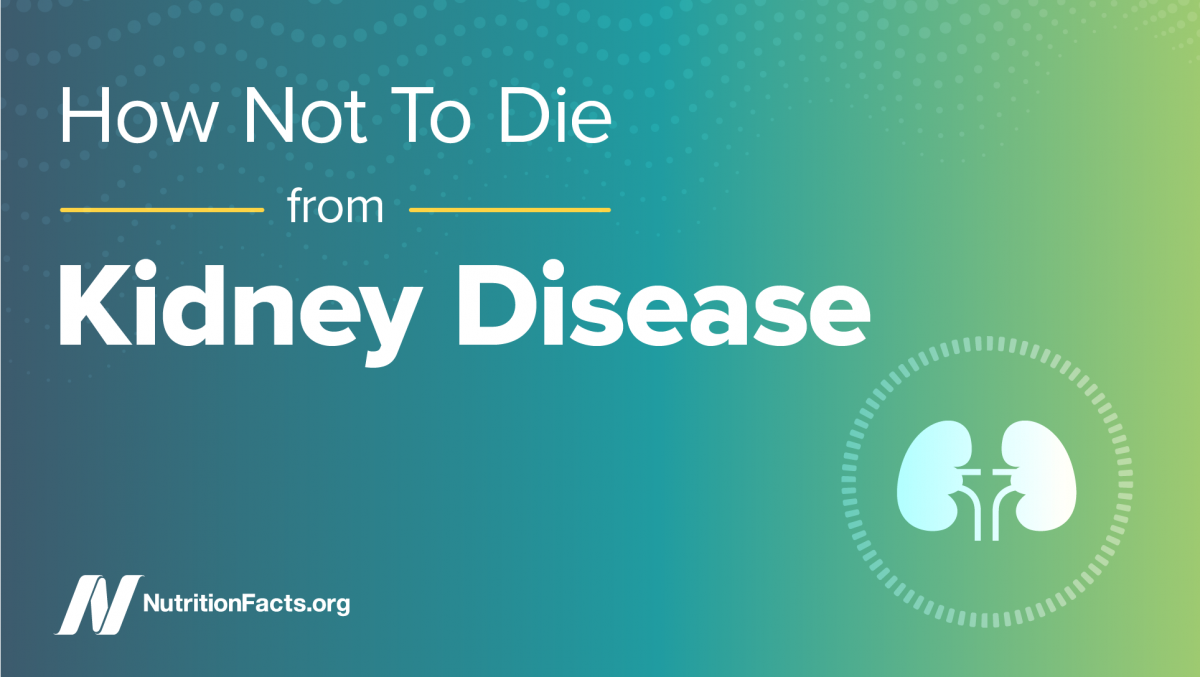Kidney failure may be both prevented and treated with a plant-based diet, and it’s no wonder: Kidneys are highly vascular organs, packed with blood vessels. Harvard researchers found three significant dietary risk factors for declining kidney function: “animal protein, animal fat, and cholesterol.” Animal fat can alter the actual structure of our kidneys. In my video How Not to Die from Kidney Disease, you can see plugs of fat literally clogging up the works in autopsied human kidneys from a study published in The American Journal of Pathology.
Animal protein can have a “profound effect” on normal kidney function, inducing “hyperfiltration,” increasing the workload of the kidney. Not plant protein, though. After eating a meal of tuna fish, the increased pressure on the kidneys goes up within only a few hours. We aren’t talking about adverse effects decades down the road, but literally within hours of it going into our mouths. What happens if, instead of having a tuna salad sandwich, you had a tofu salad sandwich with the exact same amount of protein? No effect on your kidneys. Our kidneys have no problem dealing with plant protein is no problem.
Why does animal protein cause the overload reaction, but plant protein doesn’t? It appears to be due to the inflammation triggered by the consumption of animal products. Indeed, taking a powerful, anti-inflammatory drug along with that tuna fish sandwich can abolish the hyperfiltration, protein-leakage response to meat ingestion.
There’s also the acid load. Animal foods, such as meat, eggs, and dairy, induce the formation of acid within the kidneys, which may lead to “tubular toxicity,” damage to the tiny, delicate, urine-making tubes in the kidney. Animal foods tend to be acid-forming—especially fish, which is the worst, followed by pork and poultry—whereas plant foods tend to be relatively neutral, or actually alkaline or base-forming to counteract the acid, especialy green leafy vegetables. So, “[t]he key to halting progression of CKD [chronic kidney disease] might be in the produce market, not in the pharmacy.”
It’s no wonder plant-based diets have been used to treat kidney disease for decades. In my video, you can see a remarkable graph that follows the protein leakage of subjects first on a conventional, low-sodium diet, which is what physicians would typically put someone with declining kidney function on, then switched to a supplemented vegan diet, back to the conventional diet, once more on the plant-based diet, and back and forth again. The chart is filled with zig-zags, showing kidney dysfunction was effectively turned on and off like a light switch, based on what was going into their mouths.
The first time someone visits NutritionFacts.org can be overwhelming. With videos on more than 2,000 health topics, where do you even begin? Imagine stumbling onto the site not knowing what to expect and the new video-of-the-day is about how a particular spice can be effective in treating a particular form of arthritis. It would be easy to miss the forest for the trees, which is precisely why I created a series of overview videos that are essentially taken straight from my live, hour-long 2016 presentation How Not to Die: Preventing, Arresting, and Reversing Our Top 15 Killers.
For the other videos in this overview series, see:
- How Not to Die from Heart Disease
- How Not to Die from Cancer
- How Not to Die from Diabetes
- How Not to Die from High Blood Pressure
Inspired to learn more about the role diet may play in preventing and treating kidney disease? Check out these other popular videos on the topic:
- Which Type of Protein Is Better for Our Kidneys?
- Testing Your Diet with Pee and Purple Cabbage
- Protein Source: An Acid Test for Kidney Function
- How to Prevent Kidney Stones with Diet
- How to Treat Kidney Stones with Diet
- Treating Chronic Kidney Disease with Food
- Can Diet Protect Against Kidney Cancer?
In health,
Michael Greger, M.D.
PS: If you haven’t yet, you can subscribe to my free videos here and watch my live, year-in-review presentations:
- 2012: Uprooting the Leading Causes of Death
- 2013: More Than an Apple a Day
- 2014: From Table to Able: Combating Disabling Diseases with Food
- 2015: Food as Medicine: Preventing and Treating the Most Dreaded Diseases with Diet
- 2016: How Not To Die: The Role of Diet in Preventing, Arresting, and Reversing Our Top 15 Killers
